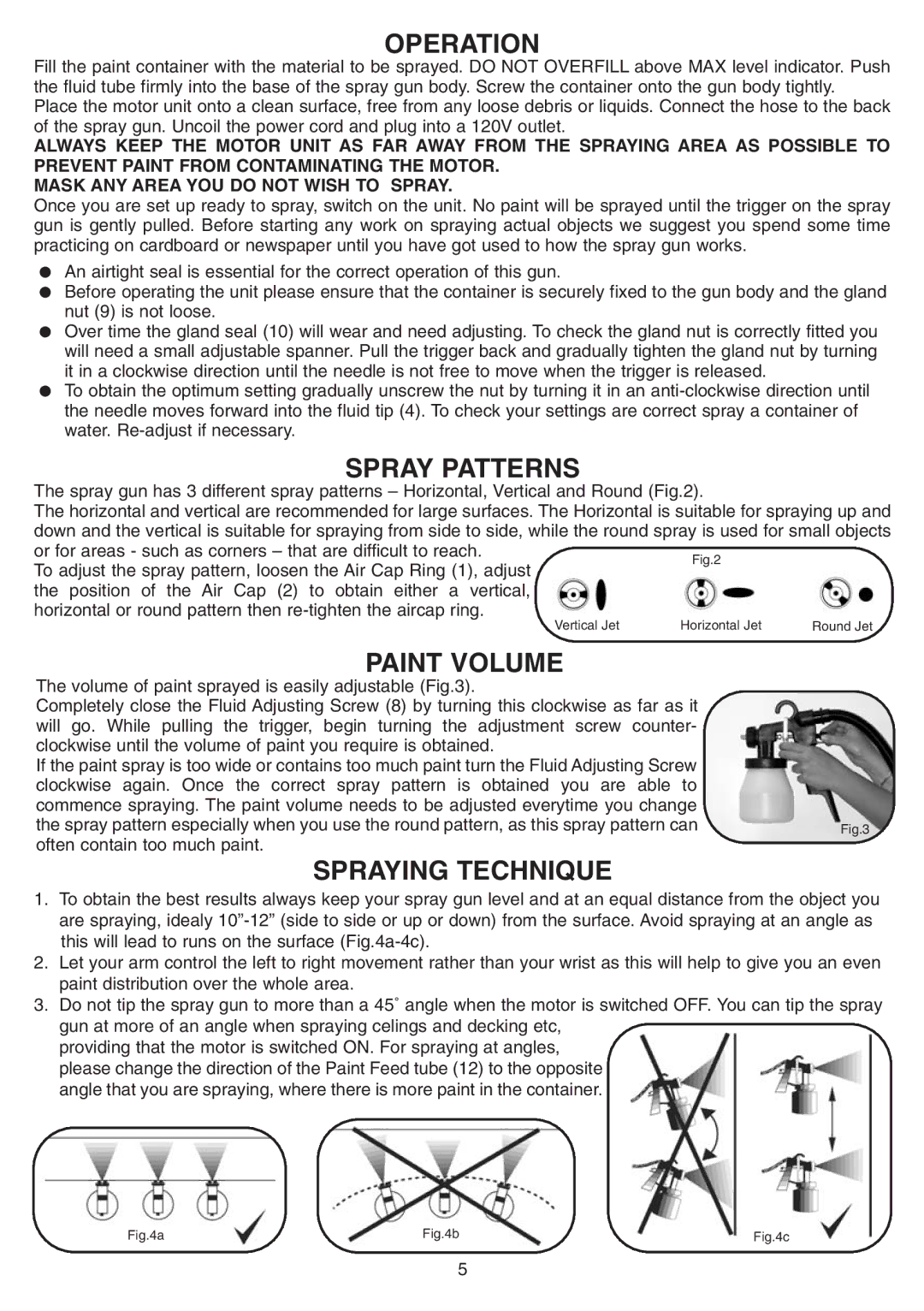
OPERATION
Fill the paint container with the material to be sprayed. DO NOT OVERFILL above MAX level indicator. Push the fluid tube firmly into the base of the spray gun body. Screw the container onto the gun body tightly.
Place the motor unit onto a clean surface, free from any loose debris or liquids. Connect the hose to the back of the spray gun. Uncoil the power cord and plug into a 120V outlet.
ALWAYS KEEP THE MOTOR UNIT AS FAR AWAY FROM THE SPRAYING AREA AS POSSIBLE TO PREVENT PAINT FROM CONTAMINATING THE MOTOR.
MASK ANY AREA YOU DO NOT WISH TO SPRAY.
Once you are set up ready to spray, switch on the unit. No paint will be sprayed until the trigger on the spray gun is gently pulled. Before starting any work on spraying actual objects we suggest you spend some time practicing on cardboard or newspaper until you have got used to how the spray gun works.
●An airtight seal is essential for the correct operation of this gun.
●Before operating the unit please ensure that the container is securely fixed to the gun body and the gland nut (9) is not loose.
●Over time the gland seal (10) will wear and need adjusting. To check the gland nut is correctly fitted you will need a small adjustable spanner. Pull the trigger back and gradually tighten the gland nut by turning it in a clockwise direction until the needle is not free to move when the trigger is released.
●To obtain the optimum setting gradually unscrew the nut by turning it in an
SPRAY PATTERNS
The spray gun has 3 different spray patterns – Horizontal, Vertical and Round (Fig.2).
The horizontal and vertical are recommended for large surfaces. The Horizontal is suitable for spraying up and down and the vertical is suitable for spraying from side to side, while the round spray is used for small objects
or for areas - such as corners – that are difficult to reach.
Fig.2
To adjust the spray pattern, loosen the Air Cap Ring (1), adjust the position of the Air Cap (2) to obtain either a vertical, horizontal or round pattern then
Vertical Jet | Horizontal Jet | Round Jet |
PAINT VOLUME
The volume of paint sprayed is easily adjustable (Fig.3).
Completely close the Fluid Adjusting Screw (8) by turning this clockwise as far as it will go. While pulling the trigger, begin turning the adjustment screw counter- clockwise until the volume of paint you require is obtained.
If the paint spray is too wide or contains too much paint turn the Fluid Adjusting Screw clockwise again. Once the correct spray pattern is obtained you are able to commence spraying. The paint volume needs to be adjusted everytime you change
the spray pattern especially when you use the round pattern, as this spray pattern canFig.3 often contain too much paint.
SPRAYING TECHNIQUE
1.To obtain the best results always keep your spray gun level and at an equal distance from the object you are spraying, idealy
2.Let your arm control the left to right movement rather than your wrist as this will help to give you an even paint distribution over the whole area.
3.Do not tip the spray gun to more than a 45˚ angle when the motor is switched OFF. You can tip the spray gun at more of an angle when spraying celings and decking etc,
providing that the motor is switched ON. For spraying at angles, please change the direction of the Paint Feed tube (12) to the opposite angle that you are spraying, where there is more paint in the container.
Fig.4a | Fig.4b | Fig.4c |
5
